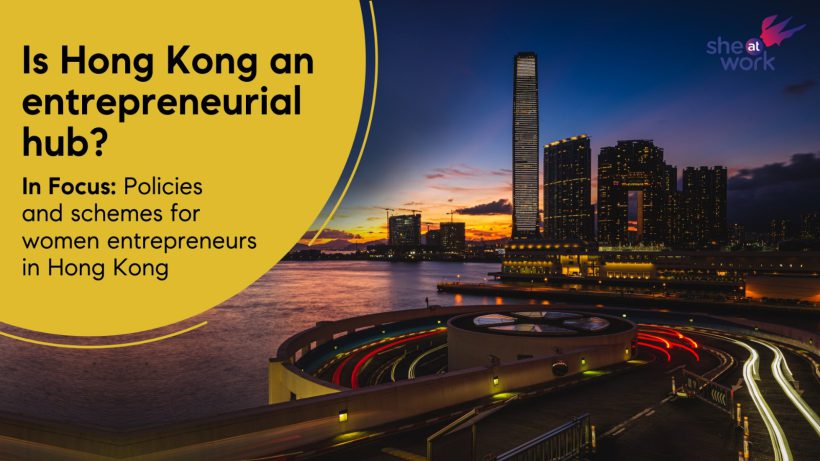In Focus: Policies and schemes for women entrepreneurs in Hong Kong
Looking at women and entrepreneurship in Hong Kong, it sets you thinking – is it an entrepreneurial hub? Because Hong Kong is a great place for entrepreneurs, as it has a number of plus points – like, excellent infrastructure, a talented global workforce, low tax rates & an ecosystem that supports start-ups.
Having a good reputation for helping SMEs, with low corporate taxes and even certain tax benefits in Hong Kong, research shows that SMEs make up around 98 per cent of Hong Kong’s enterprises and provide jobs to over 1.2 million people (which is about 47% of total employment). Hong Kong has long recognized the importance of SMEs and the government has been a strong supporter. In a survey conducted in the early 2000s, a country expert commented that in Hong Kong that the only way to get rich is to start your own business!
The benefits of setting up business in Hong Kong include – advanced legal system (including intellectual property protection), stable political environment, strong financial infrastructure & reliable tax scheme are not to be taken for granted. And additionally, start-up costs are inexpensive, making barriers to entry low. There is also a wide pool of professional resources to use, including many experts from around the world.
The government has adopted national gender strategies and made visible commitments to the greater inclusion of women in public life and economic activity. In Hong Kong, research published as far back as 1994 proposed that women entrepreneurs required specially-tailored training programmes and a dedicated consultation centre. Further research on women microentrepreneurs in 2003 called for government and business associations “to adopt a more gendered perspective of entrepreneurship and to recognize female entrepreneurs’ struggle with personal and business matters”.
Hong Kong was part of the first APEC Ministerial Meeting on SMEs and Women in Indonesia in September 2013, where members committed to collaborative regional efforts on targeted policy measures which include all of these things, for the inclusive development of women-owned SMEs
Here are some policies and schemes for women entrepreneurs in Hong Kong.
> Hong Kong’s SME policy framework
Hong Kong’s SME policy framework is broadly executed through the Trade and Industry Department (TID). Since 1995, the government has had an SME Committee (SMEC) that advises the Chief Executive on issues affecting the development of SMEs & makes suggestions on measures to support and facilitate their growth. And the members consist of SME operators, businesspeople, bankers, academics, and representatives from organisations that provide services to SMEs and representatives from the TID. SMEC published a landmark Report on Support Measures for SMEs in 2001. Also in 2001, the Hong Kong Science and Technology Parks Corporation (HKSTPC) was established. This merger of several incubation centres and technology parks marked a significant increase in government supporting start-ups during their vulnerable inception stage. And it was part of a policy drive – to develop Hong Kong as a technology hub. The Innovation and Technology Commission had been initiated in 1998, as had the Digital 21 Strategy, followed by the Applied Science and Technology Research Institute (ASTRI) in 2000 – all of which marked a turning point in industrial policy to favour high growth, high technology. In 2004, there was a re-organization so that the focus of HKSTPC evolved – to developing new technologies and supporting the commercialization of these technologies through licensing agreements. There have also been five incarnations of the Digital 21 Strategy since 1998.
https://twfhk.org/system/files/Women%20Economic%20Empowerment3.pdf
> Government financing schemes
Government involvement in VC
The government’s attempt to intervene in the venture capital market via its Applied Research Fund, a publicly financed but privately run venture capital fund predominantly for high technology companies which was in operation from 1998-2005, is a poor precedent in this area.
The 2009 GEM report recommended that “the financial community with coordination from the government should build capacity to provide debt and equity financing channels to early stage growth companies”. The recommendation was accompanied by an explanation that it was the responsibility of the financial industry to change the way it approached the financing of new and growing enterprises, and that scope exists for industry and government co-operation without endangering Hong Kong’s reputation as a “financial centre”.
A very small scheme offering pre-VC funding has been more successful. The Small Entrepreneur Research Assistance Programme (SERAP) in 2000 under the Innovation and Technology Fund (ITF) promotes technological entrepreneurship (in companies of less than 20 employees) and provides pre-venture capital stage financing (a loan only payable if revenue is generated or follow-on funding secured). A research study on the programme published in 2005 found it to be a “good model”, playing the role of angel investor with minimum government intervention. It is small, with a total of 367 projects approved and HK$416 million in funds disbursed as at the end of March 2013. Some of its start-ups went on to receive other VC funding.
These government schemes provide debt finance as the anchor of their package; but they also provide a range of other critical services designed to increase the likelihood of payback and success. HKSTPC, for example, in an effort to enable businesses to scale up to the next level and in recognition of the difficulty of raising capital, offers free investment-matching services with the Hong Kong Business Angel Network (HKBAN) and other venture capital companies.
Youth Business Hong Kong (YBHK) has supported 212 young people to start 132 new businesses since it was launched as a joint venture between The Hong Kong Federation of Youth Groups and UK-based The Prince’s Youth Business International (YBI) in 2005. It provides financial assistance like – interest-free loans and business advice and support, including an extensive mentoring programme, to people aged between 18 and 35 years.
https://twfhk.org/system/files/Women%20Economic%20Empowerment3.pdf
> WEConnect International
WEConnect International (‘WEConnect’) is a global non-profit organization that has the objective of increasing opportunities for women’s business enterprises (WBEs) to succeed in global value chains. It connects predominantly women-owned businesses with corporations and public sector organizations looking for diverse and innovative suppliers. It builds strong networks for women by linking them with procurement officers at corporations in order to enhance bidding capacity and to create the opportunity of business to business contracting. It does this via direct introductions, networking events and workshops.
WEConnect’s mission is – to empower women business owners to succeed in global markets by ensuring that their enterprises are given fair and equal access to corporate and public sector procurement opportunities locally, nationally and internationally; and by facilitating understanding amongst European companies and government agencies regarding the benefits that the diversity, innovation and added-value of sourcing from women-owned businesses can bring.
There are many businesses from Hong Kong coming forward for certification – although these tend to be larger businesses, in some cases not SMEs. Once certified, the women-owned business is listed on the WEConnect International database – which makes it accessible to the large corporate members ( thereby providing significant growth and expansion opportunities).
http://weconnectinternational.org
> Hong Kong Women Professionals & Entrepreneurs Association
In 1996, the Hong Kong Women Professionals and Entrepreneurs Association (HKWPEA) was established as a non-profit organization in September by a group of local women professionals and entrepreneurs. Based in Hong Kong, the Association reaches out and establishes relationship with counterparts in Mainland China and abroad.
Ranking high on the Association’s agenda is timely response to the consultation papers of the HKSAR Government on various policy issues.
> Women’s Foundation
Most of the women feel the need for mentoring for personal and professional support. There are several entrepreneurs’ associations for networking and accessing support in Hong Kong, including associations for women-only as well as those for men and women. The Women’s Foundation also runs a Mentoring Programme for Women Leaders which includes entrepreneurship panels and an entrepreneurs’ mentoring circle where seasoned women business owners mentor and coach up and coming female entrepreneurs.
https://twfhk.org/system/files/Women%20Economic%20Empowerment3.pdf
So, it can be noted that more entrepreneurial activity in Hong Kong will make a positive contribution to – job creation & future economic growth. If women are given the support they need to become successful entrepreneurs, the talent pool for entrepreneurship will be bigger. Facilitating an environment that meets the needs of women entrepreneurs in Hong Kong requires a joined-up and co-ordinated effort across government, the private sector the investment community, business associations, civil society and women themselves. Such an approach is indeed needed for women’s needs be reflected in policy and translated into action.










